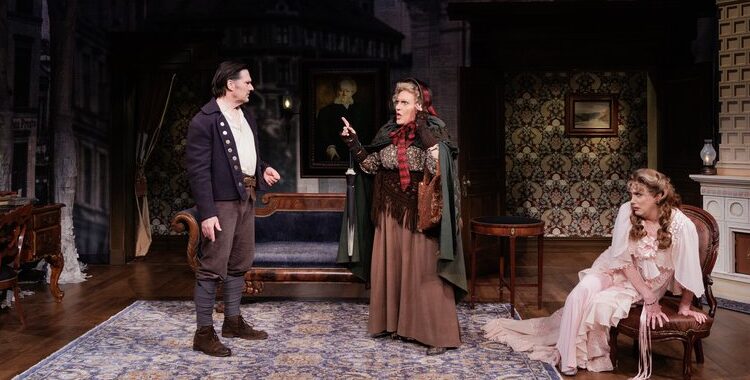Today, it feels like a common discourse in movies, books, and op-eds to look at the past to tear it down, smudge a reputation, or rethink an iconic. And while that is a worthy aspiration at times, sometimes a playwright decides to look at the past critically but with fondness, an homage rather than parody.
The two legends, Norwegian playwright Henrik Ibsen and iconic drag performer and playwright Charles Busch, on face value might appear to be opposites of each other. However, in Charles Busch’s latest work, Ibsen’s Ghost, the two instead complement each other and reveal a similar desire to investigate how women interact with each other, the world, and themselves and the role memory plays in how we define ourselves and others.
Ibsen’s Ghost, not to be confused with Ibsen’s Ghosts, is a thought experiment: What if the women in Henrik Ibsen’s life, so often reduced to a footnote in his biography, are brought together to tell their own story and threaten the legacy of the great playwright. While the characters are based on real people, the play carefully and meticulously includes the subtitle, An Irresponsible Biographical Fantasy, in case anyone mistook this for a historical, biographical drama.
The play opens with Suzannah Ibsen (Charles Busch), the recent widow of Henrik Ibsen, trying to sell 50 years of letters between herself and her famed husband, with little success. Her stepmother, Magdalene (Judy Kaye) a prolifically successful writer, and her husband’s former protégée, Hanna Salberg (Jennifer van Dyck), who after years of strife and hardship also became a successful writer and philanthropist, act as foils and personal tormentors to Suzannah, in her quest to find meaning and her own value. However, while the psychology of these relationships might be very Ibsen, the physical humor, exquisitely exaggerated facial expressions, and arch camp are all Charles Busch.
The plot itself will not win any awards and is in fact resolved abruptly with a bit of dues ex machina, a little supernatural magic, and a Rat Wife in the final scene of the play, all of which is hastily told to the audience, like a detective revealing the who-and-how-dunit at the end of a murder mystery. However, the characters and their relationships more than make up for it, with the real story and heart of the play lying in the characters monologuing on their respective pasts and finally confronting each other and themselves over long held fears, insecurities, and anger. The dialogue is a camp version of the novel of manners or a 19th century play—each person competing to go further and longer in their contrived metaphoric observations.
For all that this is a Charles Busch production, and created because, as he noted in a talk back after the show, he has always wanted to play an Ibsen heroine, the show is best described as an ensemble piece, giving all actors the opportunity to shine. Van Dyck takes over the stage as Hanna, her gusto, charm, and righteousness storming out in her various monologues and verbal show downs and Jen Cody as the housemaid Gerda delights with physical comedy. The set itself also deserves applause. The house is mentioned so frequently in the script it becomes almost a character itself, and the gorgeous turn of the century living room surrounded by foliage of Ibsen’s script pages sets the perfect mood.
The play pries into Ibsen’s famed heroines and relates them back to the timeless question of womanhood, aging, and voice—all while maintaining the playful pastiche and smartly timed camp that sits on top of what could be melodrama. It might not be saying anything new about Ibsen or the camp form, but Ibsen’s Ghost is a pleasant contribution to Busch’s repertoire and a fun romp through Ibsen’s works.
Written by Charles Busch
Director: Carl Andress
Producer: Primary Stages
Cast includes: Jen Cody, Charles Busch, Christopher Borg, Judy Kaye, Thomas Gibson, and Jennifer Van Dyck
Dates: 2 March–14 April
Time: 7 P.M.; 2 P.M. Saturday and Sunday matinees
Running time: 1 hour, 45 minutes, including intermission
(photo by James Leynse)

